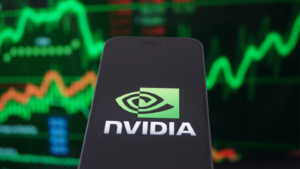Don’t Get Burned. 3 Hot Stocks to Sell Before the Coming Cooldown.
In the world of tech, the artificial intelligence (AI) revolution holds promise, but beware of AI stocks to sell — they could temper the frenzy. In 2023, AI is booming, but not all AI stocks are solid. Overvaluation, weak foundations and big competitors could spell trouble.
The Nasdaq 100 has surged 35% in 2023, largely due to AI excitement. Nvidia (NASDAQ:NVDA) is a standout. The global AI market is projected to hit $1.85 trillion by 2030. Yet, some AI stocks, despite their 2023 gains, don’t get analyst endorsements. Here are three stocks to sell, as these do not look good in the near term.
Nvidia (NVDA)

Let me be clear, I’m still bullish on Nvidia stock over the long-term. This is a chip behemoth with so many growth catalysts and secular tailwinds it’s not even funny.
That said, it’s also true that even the best, world-class, blue-chip growth stocks can become overvalued from time to time. Up 186% year-to-date, Nvidia stock certainly has the potential for a 10% to 15% downside correction. Its forward price-earnings ratio of 38 times isn’t exorbitant. But when one compares that to the S&P 500’s price-earnings ratio of 24.8 times, and looks at the company’s sky-high price-sales ratio, there are some clear signals of overvaluation.
Thus, despite strong AI-driven growth, Q2 2024’s 101% year-over-year revenue growth to $13.5 billion, and solid operating cash flow of $6.3 billion, may not justify such lofty valuations.
The big question is the sustainability of AI-driven demand, akin to Nvidia’s GPU mining cycle for cryptocurrencies. AI’s future is uncertain. For instance, how many data centers will companies build, given the ambiguous impact of AI on businesses?
Nvidia’s partnership with major Indian firms like Reliance Industries and Tata Group signifies its entry into new markets, bolstering long-term growth prospects. The company also has growth drivers in data centers, gaming and the automotive sector. However, it may not be a good investment in the near term.
C3.ai (AI)

C3.ai (NYSE:AI) initially gained attention during the AI stock boom, with its fitting ticker symbol. However, it is primarily an enterprise-focused big data company, different from the generative AI tools currently in the spotlight.
Only 17% of C3.ai’s recent bookings came from its AI platform, and its main customer is the oil and gas sector, not the glamorous partner some might anticipate in AI. Despite that, the company’s shares rose over 130% this year. However, expecting another short squeeze is unrealistic due to slow revenue growth and substantial operating losses.
New investors in 2023 might be surprised by the company’s strong year-to-date performance. However, C3.ai’s revenue growth is slowing down compared to other AI companies with double-digit gains.
It’s this lagging growth rate combined with a reversion toward the mean in terms of sentiment around AI that leads me to be worried about AI stock in the intermediate term.
Apple (AAPL)
Apple’s (NASDAQ:AAPL) is another company I think is a great long-term hold. Indeed, despite trimming my position in the past, I still hold AAPL stock.
So, why is it on this list?
Well, there are plenty of reasons why AAPL stock looks overvalued here. The company’s revenue growth rate and margins are slim. This is a stock that’s no longer really a growth behemoth. It is a cash flow generating machine, but at 28 times forward earnings, there are better options for investors’ money right now.
Of course, the quality factor is what drives many investors to this stock. That’s not debatable.
However, the company’s reliance on the iPhone, China issues and a high valuation concern critics, impacting its short-term growth potential. The iPhone contributed 53% of revenue in the first three quarters of fiscal 2023. However, this core business might slow down as upgrade cycles lengthen and improvements become less significant.
Additionally, Apple faced challenges in the Greater China region, its once-fastest-growing market. Factors like Covid-19 disruptions, protests at Foxconn and recent iPhone bans in government agencies have impacted its performance there.
Over the long term, I have no doubt Apple will continue to do well. That said, it’s the next five years I’m worried about, and I just think there’s better value elsewhere right now.
On the date of publication, Chris MacDonald has a long position in AAPL. The opinions expressed in this article are those of the writer, subject to the InvestorPlace.com Publishing Guidelines.


